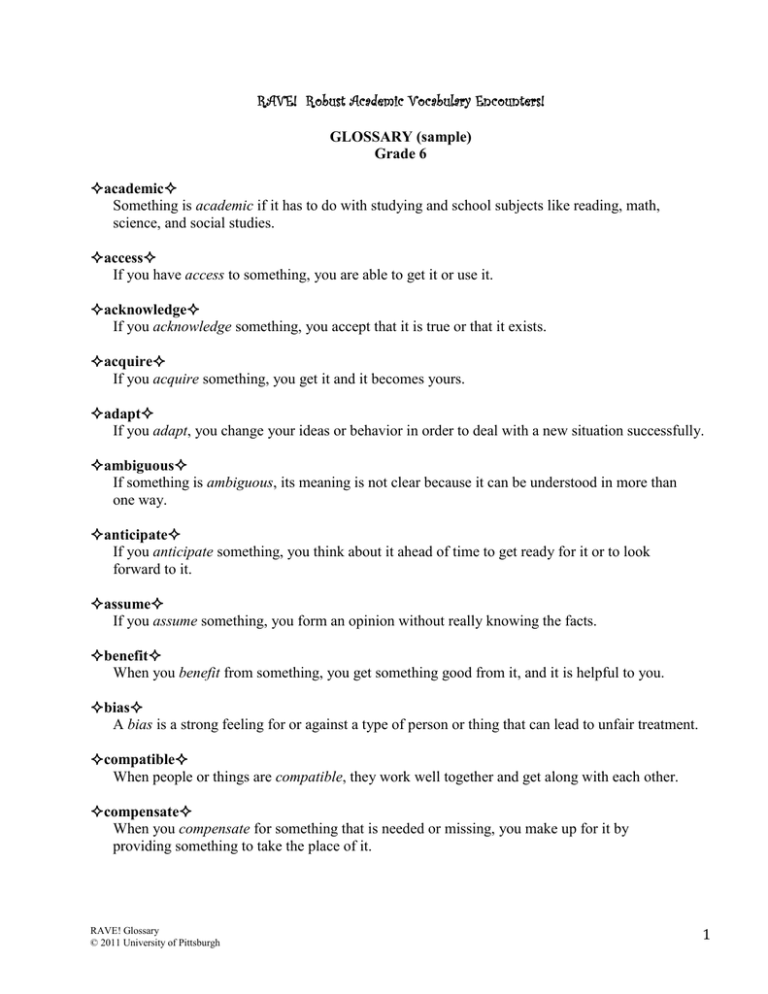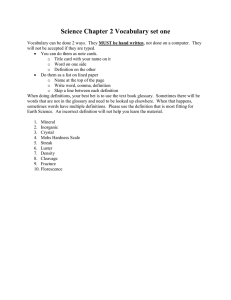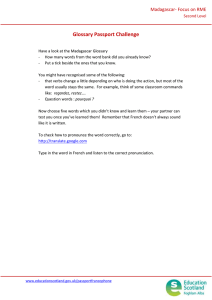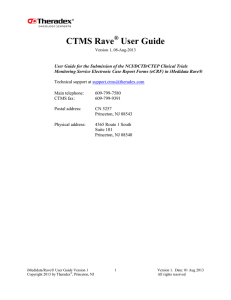RAVE! Robust Academic Vocabulary Encounters! academic science, and social studies.
advertisement

RAVE! Robust Academic Vocabulary Encounters! GLOSSARY (sample) Grade 6 academic Something is academic if it has to do with studying and school subjects like reading, math, science, and social studies. access If you have access to something, you are able to get it or use it. acknowledge If you acknowledge something, you accept that it is true or that it exists. acquire If you acquire something, you get it and it becomes yours. adapt If you adapt, you change your ideas or behavior in order to deal with a new situation successfully. ambiguous If something is ambiguous, its meaning is not clear because it can be understood in more than one way. anticipate If you anticipate something, you think about it ahead of time to get ready for it or to look forward to it. assume If you assume something, you form an opinion without really knowing the facts. benefit When you benefit from something, you get something good from it, and it is helpful to you. bias A bias is a strong feeling for or against a type of person or thing that can lead to unfair treatment. compatible When people or things are compatible, they work well together and get along with each other. compensate When you compensate for something that is needed or missing, you make up for it by providing something to take the place of it. RAVE! Glossary © 2011 University of Pittsburgh 1 confine If you confine a person or thing, you limit what they can do and where they can go. conform If you conform, you do what everyone in that situation is expected to do. consent If you consent to something, you agree to it or give permission for it to happen. consequences Consequences are the effects of people’s actions or decisions. consult If you consult with someone, you ask for their advice, information, or opinion about something. contradict If you contradict someone or something, you show that you disagree by saying or doing the opposite. controversy A controversy is a strong disagreement about something that often involves a lot of discussion and angry feelings. criteria Criteria are the list of requirements you use to make a decision or a judgment about something. derive When a thing, idea, or feeling is derived, it comes from or is developed from something else. diminish When something is diminished, there is less of it. dominant When someone or something is dominant, it is the strongest, most powerful, and most important. empirical If something is empirical, it is based on what can be observed and measured, not just your thoughts about it. exceed Something that exceeds goes beyond what is allowed or expected. extract When you extract something, you take it out or pull it out of something else. foundation A foundation provides support on which something else can be built. RAVE! Glossary © 2011 University of Pittsburgh 2 function The function of something or someone is what they are supposed to do, their purpose. implement If you implement something, like a plan, idea, or program, you put it into action. incentive An incentive is something that someone offers you to convince you to act a certain way or do a certain thing. inherent An inherent part of something is a natural, built-in part of it. initiative When someone takes the initiative or starts an initiative, they take action to solve a problem, to help someone, or to achieve a goal. innovative Someone or something is innovative when they do things in a new and creative way. integral If something is integral to something else, it is a necessary part of it. interact When people interact, they talk with each other or do things with each other. manipulate If you manipulate someone or something, you work on them to get what you want, often in a tricky way. mutual Something is mutual if people have the same thoughts or feelings about it. obtain If you want something and you obtain it, it means you were able to get it. outcome The outcome of something is how it turns out at the end. perceive If you perceive something, you sense it or become aware of it and begin to think about it in a certain way. perspective A perspective is a particular way of thinking about or viewing something. potential RAVE! Glossary © 2011 University of Pittsburgh 3 If someone or something has potential, it has the possibility of developing or happening in the future. priority A priority is something so important that it comes first before anything else. rational When people are being rational, they are thinking clearly, not emotionally, in an organized way that is based on facts. restrict If you restrict something, you limit it to control it from becoming too big or too difficult. retain If you retain something, you hold onto it and continue to use it or remember it. rigid If someone or something is rigid, they do not change or bend easily. significant Something significant is large enough or important enough to make a real difference. suspend If you suspend something, you stop it for a while or leave it hanging until a decision is made about it. sustain If you sustain something, you help to keep it going. symbolic When something is symbolic, it stands for or represents something else, even if it does not look like that other thing. transfer If something is transferred, it is moved or passed along from one place to another. undertake When you undertake a task or a challenge, you decide to take it on and do it. unify If people or things unify, they come together as one thing or one group. unique Something that is unique is the only one of its kind. virtual Something virtual is so close to being real or being true that it seems real or true. RAVE! Glossary © 2011 University of Pittsburgh 4


